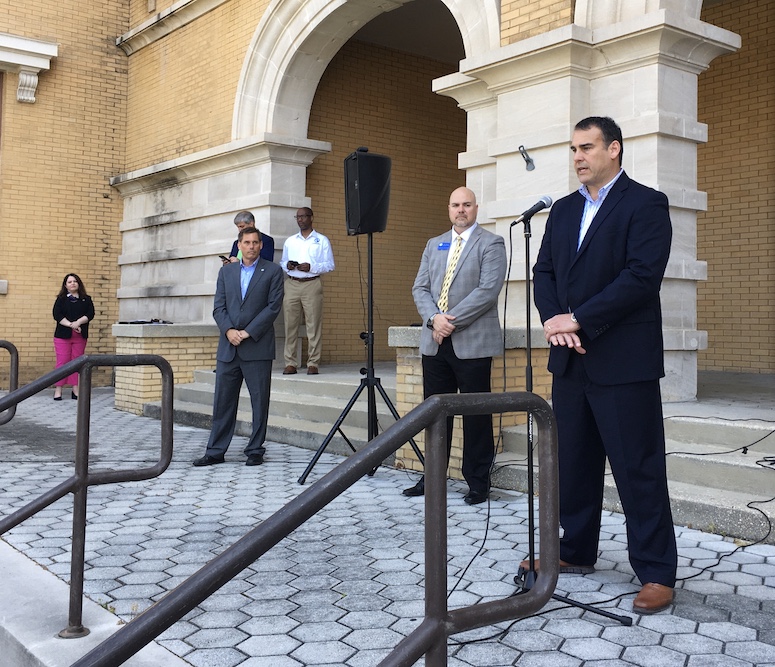Local Organizations Offer Guidance for Businesses
By Jeremy Morrison
Measures being taken to limit the impact of the COVID-19 coronavirus are dealing the business community what Pensacola Mayor Grover Robinson describes as “a serious moment.†With entire sectors of the local economy shuttered — bars, restaurants and other businesses have been temporarily closed to encourage social distancing — many businesses have experienced some economic hurt and many workers have seen their hours reduced or jobs cut entirely.
“So, there’s concern,†said Todd Thomson, CEO of the Greater Pensacola Chamber of Commerce. “People that I talk to, they’re trying to do what they can, they’re getting creative. Whether it’s shorter hours or changing their services, you know, having to cut back some on staff, or rotate staff, staying full. The question is: How long? And we don’t know the answer to that.â€
Scott Luth, CEO of the FloridaWest Economic Development Alliance, put the situation in numerical perspective with some unemployment data reflecting the recent changes.
“We had over 6,400 unemployment claims last week,†Luth said. “We’re over 74,000 this week in the state of Florida, to kind of give you a perspective of what’s out there.â€
During a Thursday morning press conference on the steps of the T.T. Wentworth Museum, FloridaWest and the chamber were joined by the Small Business Development Center at The University of West Florida to discuss various assistance options available to businesses.
Kelley Massey, the regional director of UWF’s SBDC, is more accustomed to guiding businesses through the economic distresses of natural disasters — “Mainly hurricanes. Hurricane Ivan, Hurricane Michael most recently†— and the challenges presented by the coronavirus closures are new territory, bigger territory.
“[Following Hurricane Michael] I think the state of Florida did $20 million in a fund for the Florida Small Business Emergency Bridge Loan,†Massey explained. “They’ve now allocated $50 million for the COVID-19 virus, and I have an expectation that they’ll probably actually need to put more in that.â€
The collective of business organizations laid out the steps that businesses should be taking in securing financial assistance because of economic losses due to the coronavirus closures. The groups also stressed that they were there to assist businesses through these processes.
The first step a business should take, Luth said, is to fill out the Florida Emergency Business Damage Assessment Survey at floridadisaster.biz. The survey, administered by the Florida Department of Economic Opportunity, measures the economic impact of COVID-19 and determines the allocations of federal stimulus funding.
“That disaster survey is extremely important to make sure those dollars come here to Florida, make sure we have the chance then to bring those dollars here to our community to help with the recovery effort,†Luth said.
Secondly, business owners can begin the process of applying for a Florida Small Business Emergency Bridge Loan. The loan is a short-term loan, usually capped at $50,000, meant to get a business through in the near term.
The bridge loan program’s demand was apparent immediately upon its recent launch.
“So, from when they lit it up to the next morning they received 6,000 applications,†Massey said. “With Hurricane Michael we didn’t do near that many for the entire three months we were working that program.â€
The SBDC office has likewise been busy, guiding businesses through the loan process.
“I can tell you that it’s been non-stop texts, calls, emails, people applying on our website to get that assistance, and that’s precisely what we are here for, at least in these types of times,†Massey said.
As further economic uncertainty sets in, Massey expects the U.S. Small Business Administration, which partners with SBDC, and any other organizations assisting businesses with securing financial lifelines to stay pretty busy. Especially once the federal government settles on a stimulus package dedicating trillions of dollars in economic salve.
“They did 14,000 loans for Hurricane Michael, totaling $693 million for physical damage and economic injury. The latest stimulus bill indicates that SBA will receive around $477 billion in funding to further assist small businesses, with a lot of that money going to loan and grant programs,†Massey said, adding that he was concerned with the strains such a task would put on the organization.
“We have a pretty good network of SBDCs throughout the United States, but of course we’ve never seen anything like this before,†he continued. “You know, Hurricane Michael is one thing. I can send all my staff over there and we can handle it if we’re working 12-hour shifts in a tent, which is what we did. But it just depends on how many resources they throw our way.â€
During this period of coronavirus-related economic stress, the Greater Pensacola Chamber of Commerce is coordinating some informational resources for the local business community, as well as patrons of those businesses. On the chamber’s website, pensacolachamber.com, information is available regarding business, employment, health and community resources.
Additionally, the organization has launched two Facebook pages, one pertaining to food take-out options (Pensacola Take Out and Delivery Options Amid COVID-19) and one listing deals at local establishments (Pensacola Retail and Small Business Offers Amid COVID-19).
“We will get through this together,†Chamber CEO Thomson said.
